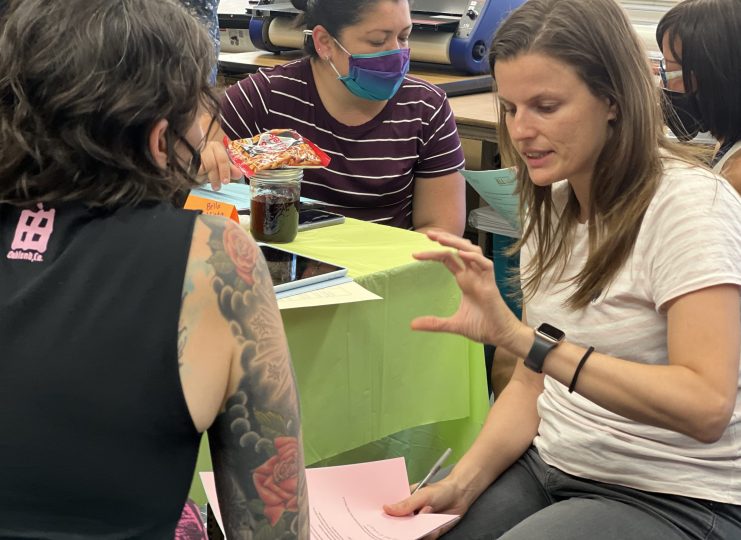
Supportive Challenge
Everyone listened intently as a focal student shared his sadness of having no friends on his teacher’s audio-recorded data. “No one likes me,” he complained. The room paused as educators took notes to support their colleague, the Public Learner. The recording continued as the student expressed his desire for more friends and described that there were only a few adults at school whom he felt he could trust.
As the recording ended, the Public Learner began to share their sensemaking around this data. After about a minute, the educator began to veer into deficit thinking. Instead of naming what role they could play to support their focal students, they honed in on the challenges they had felt serving this student. “The student doesn’t have a stable home. Their caregiver didn’t even show up to our most recent meeting. I try in class, but I can’t control their home life.”
In noticing this common equity trap, one Listener re-directed the conversation using a Supportive Challenge move we had practiced: “One of the things about equity traps is that they can lead us to focus on things that are outside of our control. We could focus a lot on all the barriers to this student’s well-being due to things happening outside of the school walls, but that’s not something we can influence too much. … In the data, I hear this student talking primarily about the rejection he feels at school, not at home. So as you think about your next steps, what are you thinking now [within your sphere of influence]?”
From there, the Public Learner refocused their next steps in supporting this student and others who feel peer rejection, citing the creation of “Friendship Circles” where students build connections and understand each other’s needs as a possible intervention.
This example reflects our signature practice of Supportive Challenge, which provides a framework for helping colleagues develop self-awareness of their implicit biases, question assumptions they might be making about students and families, and create space to consider the next steps in their practice. Supportive Challenge speaks to the powerful possibilities of listening deeply when in a collaborative conversation which can help move Learners towards asset-based mindsets and tangible actions where they can be efficacious.
Our Webinar, Transcending the ‘Culture of Nice’ to Subvert Equity Traps in Service of All Students, featured esteemed educators who observed that creating a culture where Supportive Challenge flourishes relies on cultivating certain mindsets including:
- A willingness to have one’s mind change
- A belief in relationships as a key driver of growth
- Centering students’ needs rather than blaming them for circumstances
- An underlying belief that people can change and that we are all constantly in a state of becoming
So how do we cultivate these mindsets amongst colleagues?
Our Supportive Challenge tool provides questions, practices, and protocols that create conditions for colleagues to challenge each other toward anti-racist, equity-oriented ends. Connected to Public Learning and other common sharing protocols used in collaborative conversations, these protocols rely on timed segments to maintain focus, repetition, and sentence frames which enable vulnerable sharing and space to both give and receive feedback from one another. When things go off track, the protocol is always there as a roadmap, ensuring that Learners know they’ll be both pushed and held. Protocols infuse conversations with enough structure that people will be willing to listen.
Similarly, grounding conversations in data provides a haven to return to whenever conversations take equity detours. In the above Public Learning and Supportive Challenge example, by returning the Learner to the student learning conversation they had just listened to, the Listener was able to reorient the Learner towards what the student actually said about friendships at school rather than ground actions based on their assumptions that the problem lay with the student’s caregivers. Centering data gives Learners an opportunity to take concrete, informed action within their sphere of control.
In conclusion, it’s up to each of us to Supportively Challenge each other in pursuit of ending educational inequities and racism more broadly and at Lead by Learning, we believe Supportive Challenge is not an innate skill but one adult learners can learn, practice, and build as a muscle over time in collaboration with their colleagues. As LoRayne, one of our panelists from our Webinar on Supportive Challenge, reminds us, “If we want to change predictable outcomes, we need to push against systemic racism…We can’t change this on our own. We need to do this together. The only way we can do it is if we are all turning the wheel.”
At Lead by Learning, we see collaborative conversations grounded in Supportive Challenge as opportunities to provide colleagues with both core mindsets and concrete methods to help colleagues see what they can’t see on their own, ensuring that we all are turning the wheel together in service of a better world.
We invite you to read more about the practice of Supportive Challenge in our playbook Leading by Learning, a guide to build a vibrant adult learning culture in service of equity.

